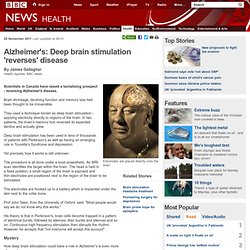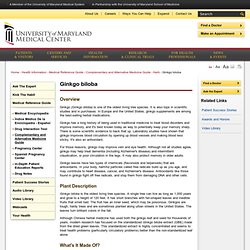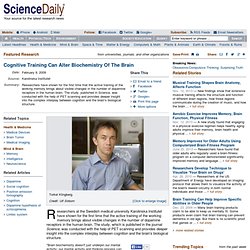

Alzheimer's: Deep brain stimulation 'reverses' disease. 28 November 2011Last updated at 00:01 By James Gallagher Health reporter, BBC News Electrodes are placed directly onto the brain Scientists in Canada have raised a tantalising prospect - reversing Alzheimer's disease.

Brain shrinkage, declining function and memory loss had been thought to be irreversible. They used a technique known as deep brain stimulation - applying electricity directly to regions of the brain. In two patients, the brain's memory hub reversed its expected decline and actually grew. Deep brain stimulation has been used in tens of thousands of patients with Parkinson's as well as having an emerging role in Tourette's Syndrome and depression. Yet precisely how it works is still unknown. The procedure is all done under a local anaesthetic.
The electrodes are hooked up to a battery which is implanted under the skin next to the collar bone. Prof John Stein, from the University of Oxford, said: "Most people would say we do not know why this works. " Mystery "How big a deal is 8%? Ginkgo biloba. Overview Ginkgo (Ginkgo biloba) is one of the oldest living tree species.

It is also tops in scientific studies and in purchases. In Europe and the United States, ginkgo supplements are among the best-selling herbal medications. Ginkgo has a long history of being used in traditional medicine to treat blood disorders and improve memory, and it's best known today as way to potentially keep your memory sharp. There is some scientific evidence to back that up. For those reasons, ginkgo may improve vein and eye health. Ginkgo leaves have two types of chemicals (flavonoids and terpenoids) that are antioxidants. Plant Description Ginkgo biloba is the oldest living tree species. A Drug That Could Give You Perfect Visual Memory. Brain health hacks - how to improve your brain health.
Older women who are more physically fit have better cognitive function. An Alberta Heritage Foundation for Medical Research Senior Scholar, Poulin finds that physical activity benefits blood flow in the brain, and, as a result, cognitive abilities.

"Being sedentary is now considered a risk factor for stroke and dementia," says Poulin, a scientist in the Faculties of Medicine and Kinesiology at the University of Calgary. "This study proves for the first time that people who are fit have better blood flow to their brain. Our findings also show that better blood flow translates into improved cognition. " The study, Effects of Cardiorespiratory Fitness and Cerebral Blood Flow on Cognitive Outcomes in Older Women, compares two groups of women whose average age was 65 years old. A natural memory enhancer - Bacopa-Monniera. Modifiable Factors to Implement Now. A French study estimates the percentage reduction in incidence of dementia that would be obtained if specific risk factors were eliminated.

Karen Ritchie, from the French National Institute of Health and Medical Research (INSERM), and colleagues assessed lifestyle data collected from 1,433 men and women, average age 72.5 years, who were followed for 7 years to track the onset of dementia. The researchers found that reducing the rate of depression would slash dementia by 10.3%, and eliminating diabetes would result in a 5% reduced dementia rate. As well, completing more education was associated with an 18.1% reduced rate, while increasing fruits and vegetable consumption cut dementia by 6.5%. Meditation increases brain gray matter. Push-ups, crunches, gyms, personal trainers -- people have many strategies for building bigger muscles and stronger bones.

But what can one do to build a bigger brain? Meditate. That's the finding from a group of researchers at UCLA who used high-resolution magnetic resonance imaging (MRI) to scan the brains of people who meditate. In a study published in the journal NeuroImage and currently available online (by subscription), the researchers report that certain regions in the brains of long-term meditators were larger than in a similar control group. Chocolate, Wine And Tea Improve Brain Performance. All that chocolate might actually help finish the bumper Christmas crossword over the seasonal period.

According to Oxford researchers working with colleagues in Norway, chocolate, wine and tea enhance cognitive performance. The team from Oxford’s Department of Physiology, Anatomy and Genetics and Norway examined the relation between cognitive performance and the intake of three common foodstuffs that contain flavonoids (chocolate, wine, and tea) in 2,031 older people (aged between 70 and 74). Participants filled in information about their habitual food intake and underwent a battery of cognitive tests.Those who consumed chocolate, wine, or tea had significantly better mean test scores and lower prevalence of poor cognitive performance than those who did not. Cognitive Training Can Alter Biochemistry Of The Brain. Researchers at the Swedish medical university Karolinska Institutet have shown for the first time that the active training of the working memory brings about visible changes in the number of dopamine receptors in the human brain.

The study, which is published in the journal Science, was conducted with the help of PET scanning and provides deeper insight into the complex interplay between cognition and the brain's biological structure. "Brain biochemistry doesn't just underpin our mental activity; our mental activity and thinking process can also affect the biochemistry," says Professor Torkel Klingberg, who led the study. "This hasn't been demonstrated in humans before, and opens up a floodgate of fascinating questions. " The neurotransmitter dopamine plays a key part in many of the brain's functions. Disruptions to the dopamine system can impair working memory, making it more difficult to remember information over a short period of time, such as when problem solving. Taking fish oil supplements can reduce memory loss in old age, claim scientists.